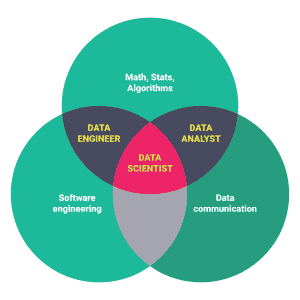Unfolding the difference between Data Engineer, Data Scientist, and Data Analyst: Data Engineers are essential professionals responsible for designing, constructing, and maintaining an organization’s data infrastructure. They create data pipelines, ETL processes, and databases to facilitate smooth data flow and storage.
With expertise in programming languages like Python, Java, SQL, and knowledge of Big Data technologies like Hadoop and Spark, Data Engineers optimize pipelines for Data Scientists and Analysts to access valuable insights efficiently.
Data Scientists, on the other hand, extract valuable information from complex datasets to make data-driven decisions. Proficient in programming languages like Python or R, data manipulation libraries like Pandas, and Machine Learning frameworks like TensorFlow and Scikit-learn, Data Scientists uncover patterns and trends through Statistical Analysis and Data Visualization.
Machine learning engineers specialize in designing, building, and deploying Machine Learning models at scale. Collaborating with Data Scientists, to ensure optimal model performance in real-world applications. With expertise in Python, Machine Learning algorithms, and cloud platforms, Machine Learning engineers optimize models for efficiency, scalability, and maintenance.
Together, Data Engineers, Data Scientists, and Machine Learning engineers form a cohesive team that drives innovation and success in Data Analytics and Artificial Intelligence. Their collective efforts are indispensable for organizations seeking to harness data’s full potential and achieve business growth.
Data Science vs. Data Engineering: Unraveling the Key Differences
In the digital era, Data has become the lifeblood of businesses, driving critical decision-making processes and enabling organizations to gain valuable insights. Two prominent roles that play a crucial part in this data-driven landscape are Data Scientists and Data Engineers. While these roles may sound similar at first glance, they have distinct responsibilities and skill sets.
In this comprehensive article, we will delve into the differences between Data Science and Data Engineering, explore the roles and responsibilities of Data Scientists and Data Engineers, and address some frequently asked questions in the domain.
Data Science: Extracting Insights from the Abyss of Data
Data Science is an interdisciplinary field that combines Statistical Analysis, Machine Learning, Data Visualization, and domain expertise to extract meaningful insights and knowledge from vast and complex datasets. At the core of Data Science lies the art of transforming raw data into actionable information that can guide strategic decisions.
Role of Data Scientists
Data Scientists are the architects of Data Analysis. They possess a deep understanding of statistical methods, programming languages, and Machine Learning algorithms. Their primary responsibilities include:
Data Collection and Preparation
Data Scientists start by gathering relevant data from various sources, including databases, APIs, and online platforms. They clean and preprocess the data to remove inconsistencies and ensure its quality.
Exploratory Data Analysis (EDA)
EDA is a crucial step where Data Scientists visually explore and analyze the data to identify patterns, trends, and potential correlations.
Model Development
Data Scientists develop sophisticated machine-learning models to derive valuable insights and predictions from the data. These models may include regression, classification, clustering, and more.
Model Evaluation and Optimization
After building the models, Data Scientists evaluate their performance and fine-tune them for better accuracy and efficiency.
Communication of Results
One of the essential aspects of a Data Scientist’s role is effectively communicating complex technical findings to non-technical stakeholders, enabling informed decision-making.
Skills and Tools of Data Scientists
To excel in the field of Data Science, professionals need a diverse skill set, including:
- Programming Languages: Python, R, SQL, etc.
- Statistical Analysis: Hypothesis testing, probability, Regression Analysis, etc.
- Machine Learning: Supervised and Unsupervised learning techniques, Deep Learning, etc.
- Data Visualization: Matplotlib, Seaborn, Tableau, etc.
- Big Data Technologies: Hadoop, Spark, etc.
- Domain Knowledge: Understanding the specific domain where they apply Data Analysis.
Data Engineering: Laying the Foundation for Data Success
While Data Science deals with Data Analysis and insights, Data Engineering focuses on the design, construction, and maintenance of robust data pipelines and infrastructure. Data Engineers play a pivotal role in ensuring that data is accessible, reliable, and available for analysis.
Read Blog ✅✅Data Engineering Interview Questions and Answers
Role of Data Engineers
Data Engineers are the architects of Data infrastructure. Their primary responsibilities include:
Data Storage and Management
Data Engineers design and implement storage solutions for different types of data, be it structured, semi-structured, or unstructured. They work with databases and data warehouses to ensure Data integrity and security.
Data Integration and ETL (Extract, Transform, Load)
Data Engineers develop and manage data pipelines that extract data from various sources, transform it into a suitable format, and load it into the destination systems.
Data Quality and Governance
Ensuring data quality is a critical aspect of a Data Engineer’s role. They establish data governance processes to maintain the accuracy and reliability of data.
Performance Optimization
Data Engineers optimize data pipelines and databases for better performance and scalability, allowing smooth and efficient data processing.
Collaboration with Data Scientists
Data Engineers collaborate closely with Data Scientists to provide them with access to the necessary data and ensure the seamless functioning of data-driven applications.
Skills and Tools of Data Engineers
Data Engineering requires a unique set of skills, including:
- Database Management: SQL, NoSQL, NewSQL, etc.
- Data Warehousing: Amazon Redshift, Google BigQuery, etc.
- ETL Tools: Apache NiFi, Talend, etc.
- Data Modeling: Entity-Relationship (ER) diagrams, data normalization, etc.
- Big Data Processing: Apache Hadoop, Apache Spark, etc.
- Cloud Platforms: AWS, Azure, Google Cloud, etc.
Difference Between Data Engineer, Data Scientist, and Data Analyst
| Aspect | Data Engineer | Data Scientist | Data Analyst |
| Primary Role | Design and build
Data pipelines |
Research and develop
Machine Learning models Statistical Analysis, Machine Learning, Data Modeling |
Interpret and analyze
Data to derive insights Data visualization, reporting, Data cleaning, basic statistics |
| Programming Skills | Proficient in
Python, Java, SQL, |
Strong programming skills
(Python, R, Scala) |
Basic programming skills
(Excel, SQL) |
| Tools &
Technologies |
Hadoop, Spark,
Apache Airflow, Kubernetes, etc. |
TensorFlow, Scikit-learn,
Pandas, NumPy, Jupyter, etc. |
Excel, Tableau, Power BI,
SQL Server, MySQL, Google Analytics, etc. |
| Data Focus | Structured, Semi-
structured, and unstructured Data |
Structured and unstructured
Data from various sources (e.g., sensors, social media, text) |
Primarily structured Data,
but may include some unstructured data |
| Problem Solving
Approach |
Optimize Data pipelines,
troubleshoot performance issues, scalability challenges |
Create predictive models,
design experiments, draw insights, and make Data-driven decisions |
Identify trends, patterns,
and anomalies in Data, address business questions, support decision-making |
| Educational
Background |
Computer Science,
Software Engineering, Data Engineering, or related field |
Computer Science,
Mathematics, Statistics, Machine Learning, or related field |
Mathematics, Statistics,
Data Science, or related fields |
Note: The above table provides a generalized overview of the differences between Data Engineers, Data Scientists, and Data Analysts. Actual roles and responsibilities may vary based on individual organizations and specific job descriptions. Additionally, these roles may overlap in some cases, and individuals with these job titles might possess skills from multiple categories.
Data Engineer v/s Data Scientist: Which is Better?
It is essential to recognize that both Data Engineering and Data Science are crucial components of a successful data-driven organization. The choice between Data Engineering and Data Science depends on your interests, skills, and long-term career goals. Some individuals may find joy in building robust data infrastructure as Data Engineers, while others may be passionate about leveraging data to gain insights and make predictions as data scientists.
Read More ✅✅ Data Scientist Eligibility Criteria
Furthermore, the demand for both roles is high, and organizations often need a well-coordinated team of Data Engineers and Data Scientists to tackle complex data challenges effectively. Ultimately, the “better” choice comes down to personal preference and finding a role that aligns with your strengths and interests in the field of Data Analytics.
FAQs
Are Data Science and Data Engineering interchangeable terms?
No, Data Science and Data Engineering are distinct domains with different objectives. Data Science focuses on extracting insights and knowledge from data, while Data Engineering deals with building and managing data pipelines and infrastructure.
What are the educational requirements for becoming a Data Scientist or Data Engineer?
Most Data Scientists hold advanced degrees (Master’s or Ph.D.) in fields like Computer Science, Statistics, or related disciplines. On the other hand, Data Engineers often have a background in Computer Science, Software Engineering, or a related field, but a Bachelor’s degree may suffice in some cases.
What programming languages are essential for Data Scientists and Data Engineers?
For Data Scientists, Python and R are widely used due to their extensive libraries for data manipulation and machine learning. Data Engineers typically work with languages like Python, Java, or Scala, depending on their specific needs and the technologies used.
How do Data Scientists and Data Engineers collaborate on projects?
Data Scientists and Data Engineers work collaboratively throughout the data lifecycle. Data Engineers provide data access and preprocessing pipelines to Data Scientists, enabling them to focus on analysis and model development. This collaboration ensures a seamless flow of data-driven insights.
Empowering Your Data Journey
In conclusion, Data Science and Data Engineering are complementary yet distinct fields that together form the backbone of a data-driven organization. Data Scientists unravel hidden patterns and insights from data, while Data Engineers build the robust infrastructure needed to handle large volumes of data efficiently.
Check Jobs?? Azure Data Engineer Jobs











